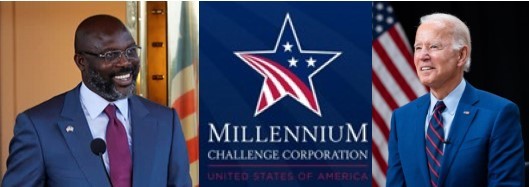Liberia has finally made a pass in the Millennium Challenge Corporation’s scorecard under President George M. Weah’s administration, making headways in fourteen (14) out of the twenty (20) indicators and subsequently crossing the benchmark for consideration, which requires a country to pass half of the scorecard and a mandatory pass in the control of corruption and democratic rights indicators. This interprets to Liberia qualifying for a MCC compact for the first time under President George Manneh Weah’s administration.
Millennium Challenge Corporation (MCC) compacts are five-year agreements through which the United States provides grants to partner countries to support programs to reduce poverty through economic growth. MCC compacts are designed to target key constraints to economic growth and poverty reduction, and generate increased income for beneficiaries. Key constraints vary by country, and accordingly MCC compacts have funded a wide variety of projects in infrastructure (e.g., roads, power, ports, water, and sanitation), agriculture, irrigation, property rights, education, health, and financial services.
To make a pass in the overall MCC scorecard, a country must have passed at least 10 of the 20 indicators, with at least one pass in each of the three categories; passed either the political rights or civil liberties indicator; and passed the control-of-corruption indicator.
Liberia came close to passing the MCC scorecard in 2022, but felt short of being selected by the MCC Board of Directors for a compact. However, the Ministry of Finance and Development Planning, led by Samuel D. Tweah, Jr., has made massive improvements in the growth and development indicators.
For fiscal year 2024, Liberia made a clear pass in seven (7) out of eight (8) economic freedom indicators: fiscal policy (51%), inflation (7.6), trade policy (63%), gender in the economy (84%), land rights and access (78%), access to credit (73%) and employment opportunity (100%). The only indicator in which Liberia did not make a pass in this category is the regulatory quality, with a mark of 46%.
In the ruling justly (democratic rights) category, Liberia passed five of the six indicators: political rights, civil liberties, control of corruption, rule of law and freedom of information, but felt short to meet the minimum requirement to make a pass in the government effectiveness indicator.
The third category, investing in people, Liberia made a pass in health expenditure (62%) and immunization rates (54%), but went below the benchmark for education expenditure (24%), natural resource protection (0%), girls’ primary education completion rate (19%) and child health (37%).
Meanwhile, the MCC Board of Directors is expected to select eligible countries for MCC program assistance in December 2023. In determining a country’s eligibility, the Board considers three factors: a country’s policy performance; the opportunity to reduce poverty and generate economic growth within a country; and the availability of funds. The selected countries, if they agree to participate, then develop a compact proposal with MCC.
If selected, Liberia stands to receive up to US$500 million development grant that will impact several sectors and reduce the burden on President Weah’s pro-poor administration, including roads, power, sanitation, agriculture, education, health and financial services.







